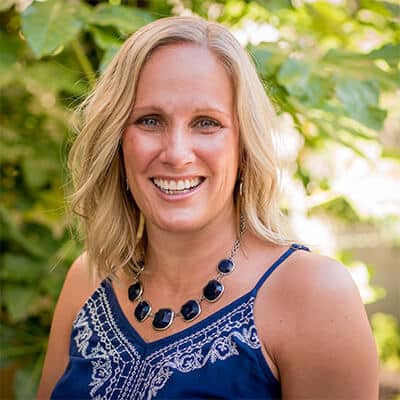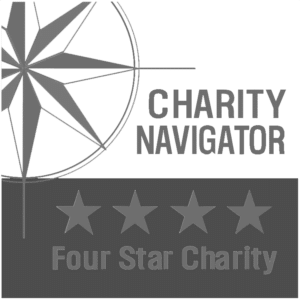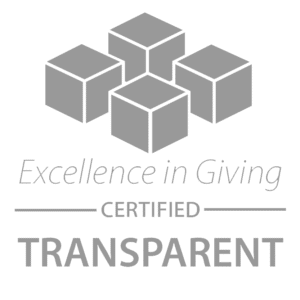You’re listening to Together by AGCI. I’m Marisa Butterworth.
Today we get to hear from my friend, boss, and—I’m sure you’ll agree after listening to this—just an all-around inspirational individual, AGCI President Hollen Frazier. Hollen is smart, passionate, and literally has more energy than any adult I’ve ever met.
She is a great storyteller, but most importantly, I have watched as she has led our team and demonstrated what it looks like to continually turn to the Lord for guidance in all things big and small. Today, Hollen is coming on to share about the spiritual calling of the work that we do at AGCI, and I am so honored to have her join me.
Hollen.
Hello.
I am so excited to have you on the podcast today. Thank you for taking time out. I know that you are maybe the busiest person seriously that I have ever met, so I really extra appreciate that you’re here today.
Oh, my goodness. Marisa, I am so excited to get to spend time just sharing and talking with you. It’s always such a pleasure and joy for me to spend time with you.
Thank you. Well, I’m going to jump right in because I want to get to this.
I love everything about what we’re talking today. And I love your family story. Your story. It’s become, it’s become everyone’s story. But AGCI was founded by your parents and your sister about 30 years ago. Would you just share what you would like about the story, of how that all came about?
It’s pretty incredible. Yeah, it really is a pretty incredible story, especially now that I have kids that are 18 and have now surpassed 18. It really is remarkable. But when my older sister was just 16 years old, she actually went to my parents and said, Hey, I’m really wanting to go to Bible school in Europe. I want to get my G.E.D., I want to work for a year to save up my money, and then I want to go. And of course, my parents looked at her and said, Absolutely not. You’re not dropping out of school. You’re not going across the ocean for Bible school. And, you know, haphazardly, my dad made the statement, if you can get the superintendent of Portland Public Schools to tell me that’s a good idea, that’s about the chance you have.
That’s why you think that’s where you think like I’ve got this. Oh yeah. Parent You’re like, Really? If I keep getting pulled out of there, you know, Ziglar is in the back. So a week later, my dad’s phone rang and it was the superintendent of Portland Public Schools.
And he said, Hi, Ron, you know, your daughter just walked out of my office and I want you to know that I’ve been in education for 30 years, and I’m here to tell you that traditional education is not for everyone.
And he told my dad that he believed Heather had a really good head on her shoulders, she had a strong plan, and that he just believed that my dad should support my dad and mom should both support her in getting her G.E.D. So she did.
She got her G.E.D. She worked at Nordstrom for a year and saved every penny. And then right at 18 took off to Bible School in England. And so kind of fast forward to that summer and you know, my parents thought she was coming home just for the break before going back. And yet again, she called them from England and said, Hey, I actually don’t want to come home this summer. I want to go into Bucharest, Romania, and I want to help with the orphans that are there, since, you know, Ceausescu had just been finally killed.
Okay. Literally tanks were still in the streets, bullet holes in in the sides of buildings. Wow. And she just said, I believe God’s calling me to go to Bucharest and see how I can help children that are living in the orphanages there.
And again, I mean, this is before your poor parents and before cell phones and GPS tracking systems and, you know, your phone calls or your, you know, long distance landlines. And they were like, you cannot do that. You are an 18 year old young girl.
You can’t go into war torn Romania. And, you know, she said, I’m 18 now and that’s what I’m going to do. So and she did. She went in to Bucharest and she volunteered at orphanage number one for about a month.
And then when she kind of finished that time in Romania, she did come home for just a really short stint before going back to Bible School. And in that time she just shared all the photos of the kids that she had worked with and started sharing their stories and kind of through another whole God-size story and started really laying it on my parents heart to adopt. Of course, it was my mom’s heart first and my dad trailed way behind her. There was four of us at that time, and so they ended up deciding they wanted to move forward and adopt.
And so my sister at Christmas time, 1990, traveled back to Romania and did the adoption of my youngest sister for my parents and came home January of 1991. And because she was just so young. And it was. One of the first adoptions out of Romania post-war.
The news media were there and my sister statement. I’d help anyone who wanted to adopt. And as you can imagine, my parents phone started ringing off the hook after All God’s Children was born. So it truly was out of the adoption of my youngest sister by my older sister for my parents.
That started it all the trail of AGCI. of course, I was 14 at the time and was like, you know, this is crazy. I’ll never work for AGCI. I mean, they were so busy. For those in ministry, it can be hard on families, you know.
Yeah. Add kids to it. It takes a toll on everyone. Yeah, it was a big, big lunch. My parents ended up slowly leaving both their careers to go full time with AGCI, but that was, you know, after the first few years.
Okay. So you mentioned like 14. You didn’t want anything to do with it, but it’s become like kind of a family affair, like everybody’s working on this. So when did you feel like your own personal calling to this work?
You know, it’s it’s funny, Marisa, I can say that, you know, and I get the question a lot, how have you been in social service and like this field of work for so many years? This is my 26th.
Well, I think may will be going into my 27th year. And it is hard, like we see hard things there’s a reason that there’s hyper an out. So I have to say to answer their personal calling piece, I think God has kind of lit that fire at different points in that time period.
For me, looking back to the first and earliest, I know I’ve shared many times with people, but it really was at 18, making him that first trip to Bulgaria and stepping in to my very first government run institution and just seeing kids basically alive but dead.
I mean, that’s how I would summarize it. And the smells and just the despair and the kids could just be like human beings, could be just cast away in that manner at the young age of 18 was absolutely shocking.
And in that moment, I really did understand why my parents were all in and just gave up everything to, like, give their lives to this work, including my sister. So that definitely was the earliest, I think fast forward maybe probably another like eight, 9 or 8 years.
And I actually had just I think I had just quit actually and I had had my first born, I had had my first born son and he was turning a year. And I remember as a kid I always wanted to be a mom.
So I just that struggle, right, as a working parent. Oh, yeah. Maternal versus like I love what I do. But like that for me was always first and foremost, like my top priority. Wife, mother, of course, got at the top of it all work that I had just gone to my mom and said, I don’t think I can leave them anymore. I want to take time. I want to be home. And she had said, no problem, but will you just go down to Guatemala and, you know, get the step working with like really the day we like to talk about mom and what back at the beginning when you put me on my back.
But that’s my favorite. Yes. Oh, my gosh. And I said, well, I have to I don’t want to leave Andrew. And they were like, That’s fine. Take Andrew with you. My husband was pastoring at that point in our marriage.
And so what was supposed to be a one-week trip and then coming home and, you know, being home with him full time and turned into three years on the ground in Guatemala. So I have to say, that’s another personal call in case where I just had this path of what I wanted.
And I think what hit me was the first time I opened the door to our R.A. Holcomb’s, and there was a sibling group of three. The youngest was 14 days old, and the middle girl was five and the oldest was 12.
And the dad had burned the home down. The oldest had been on the streets with the two little ones, including the newborn. Newborn. And that was immature. I mean, she maybe weighed 6 lbs and. I’ll never forget the police officer at the door that day as I opened it and seeing these three precious girls, it was the first ever three girls people into our Hannah’s Hope home in Guatemala. Was that sibling of three and and I just bathed in them and I mean the lice hair is down their back having to cut you know just all of that.
I mean, the dirt just coming off their bodies. But I remember tucking her in that night, and at that point, we only had cribs. We weren’t the home was supposed to be for like 0 to 3. Okay. So and it ended up very quickly not being that.
So I had to put this little girl into this crib to sleep. And I will never forget her looking at me as I looked at her and said, Honey, honey, it’s okay. You can go to sleep. You’re safe.
And her looking back at me and saying, I just can’t close my eyes because everything is so beautiful. I don’t fall asleep and wake up and have it be a dream. And I think in that moment, it really just hit me like my God was at work and I was exactly where I was supposed to be.
And as we really develop the program of our Hannah’s Hope homes and like this elevated one-on-one care. It was by no accident. I had just gone through the first year with my firstborn and was so passionate about yes, we do it right only on our first one.
So oh, of course, when we know everything is I didn’t go down after number four we love the little different but having it have been the first wedding and baby massage twice a day and yes, I mean, all of it we I would say we incorporated into the home and known and these kids were loved.
And so that I think would be second. And I’m probably answering a very quick question with a very long you know, I love it. I love hearing that story to you and I love that God was gentle with you in that, you know, but that you were also open to seeing, you know, okay, I will go to
Guatemala. I will do the it. You think it’s just to set up computers and little did you know what that was going to look like that that that the timing was actually like perfect for you to do that.
It really was. And then the last these would be my three kind of sounds of of that question. But the last was five years ago when I walked into this Haitian orphanage and just was confronted with the fact that we had, you know, had these Hanna’s homes, which were like elevated care of kids we had on almost
every continent over 25 years that we worked on, but seen those kids that day from floor to ceiling in cages with the same expressions on their face faces as I saw at 18. And just that reality of God are we believe in of for enough and are we are we are we doing enough?
Like we at that point had been serving kids for 25 years, but really was struck with not having a large enough vision and believing for more kids to find a pathway to faith and family and independence, but like that, that transformational healing and love.
And so seeing that kids were still living like that after so many years of service just was a moment for me that gave me like renewed energy to think back and keep going. I mean, going off of that whole thing where you’re having this moment five years ago and God speaking to your heart again in a new
way, what did that look like when you brought AGCI into that? How did you guys make that decision? How was that something you kind of came to the team with and or did you go home and I’m assuming spend some time in prayer of what could this look like?
What did that whole thing look like? That sounds so scary and big to make a move like that. You know, it it I will say it wasn’t just a quick moment where it all came together. God, like you said, has always been so good to me.
And I would say even our entire executive team, we were meeting the other day with someone. I mean, it’s crazy. Like our executive leadership team at AGCI spans the shortest I think the shortest leader on the team has been here eight years in the longest 17.
I mean, we we have served together. And so having such a trusted group of people that simultaneously are committed to seeking the Lord and where and how he wants us to go, we really have a relationship where we can lean in and lean out until we all feel like it’s right.
And so I would say. Marisa. It was probably over the course of a year of a lot of prayer and challenging ideas and thoughts on is this sustainable, is this scalable? Like I think and also just looking back and saying, hey, we don’t need to reinvent the wheel necessarily, but let’s pause and look back at what has God done. And what was really remarkable when we did it is what has become our child advocacy model today. We were able to look back and see where God planted each one of those seeds over 25 years. It’s just taking that space and challenging ourselves with how can we think bigger, believe God for more, gave us that opportunity to kind of rise up and look down at what has taken place and got it done. It it was there. So really putting that model together. The hardest part, of course, for me was from a personal level, telling my parents that we were closing all of the Hannah’s Hope homes.
Yes. Launched these child advocacy models. I thought that was probably the easiest. But I will say they’ve always been super supportive, supportive of me. But, you know, it’s hard. We’ve done that for 25 years. So I’m sure vision to say, no, we’re actually going to intentionally close these homes because we actually don’t want to.
We’re believing God for a whole country of elevating care and we want to focus there and see how he’s going to use us to make that happen, which has been so cool because we have seen how God has used us and I won’t go into all of that right now, but it’s amazing from this perspective, from someone looking, you know, from the outside in to have seen how God honored that and had set that up all along. You know, sometimes when you’re in the weeds of it, you can’t see it. But you get to that point where you’re like, Oh, you’ve been doing this all along.
It was just a matter of stepping out and having faith that this was indeed the way, you know, that he didn’t just put this on your heart for no reason. And of course, there is work to be done, you know, of figuring that out.
But I think that’s just so cool and so perfectly God, like just a total ridiculous God thing where you’re like, Oh, you’re doing it to us again. You’re always, always 100 steps ahead of us. Oh, growing up, thankfully, I mean.
Oh, my gosh. So excuse us. Yeah, seriously. So we recently had a podcast with Kirsten on it, who’s our VP of all of our international programs. And she was talking about kind of like how a guy knows where they’re headed next.
Can you kind of explain what goes into those decisions on a spiritual level? Yeah, absolutely. I mean, it’s kind of a it’s twofold. It’s definitely discernment, right? The spiritual gift of discernment, I can tell you over the years has been such a foundational piece.
I mean, prayer and discernment, two huge elements to like saying yes or no. And then there’s also kind of that third piece where God just sometimes opens doors that are so miraculous, where we’re getting these invitations to come, that when you step back and you discern and then you fall to your knees and pray through that, like, Lord, is this an open door that we’re supposed to walk through? I mean, we always are praying, Marisa, Lord, stay out before us. Go out before us. Don’t let us go before you or and close the door. If we’re not supposed to go, don’t let us, like veer to the left or veered to the right, but really staying in a hard stance of continually seeking help in direction. It’s not just a one time and a one time decision necessarily process. It’s an every day submitting to the power of the Holy Spirit to go out before us, to seek the right leaders, to open the right doors.
We also use the brains that the Lord has blessed us with to say, Is this the right time? Are these the right people in the right places to take whatever that next step is? So all of that together, I think, really helps lead sound decisions that we know are bathed in prayer.
Yes. Well, and I love that the leadership team has been here for so long because they’ve they’ve seen that move and they, you know, hopefully. Does that mean that maybe when you guys come to them with new things that they don’t freak out?
Or is that still happen where they’re like, oh, I might just come out of the meeting and where that happens. Yeah, I see my husband, one of us with her jaw on the ground going, What are we doing?
What for is God opening? The other two of us like cookie dropping going. Yeah right this we’ve got we’ve got this what got me this was happening. Oh, my gosh. Yeah. I’ve had those experiences in my life where I’m like, Oh, here I am again freaking out.
But so you answer that question. Absolutely. That’s perfect. I don’t blame her whatsoever. So as like believers, I think if someone’s hearing your story, they’re asking themselves questions because, you know, everyone has a different story, everyone has a different calling.
But we’re all called to be the hands and feet of Jesus, whatever that looks like, whatever your calling is. So what are ways that people that are listening can get more involved in our work or and I would add like a second part to that.
Like how do they discern and this is I mean, I’m not putting you on the spot for like, you know, all the answers to this, but like, what are some steps that you would have them take if they want to get involved in the work we’re doing?
And secondly, like how they discern what they’re supposed to be doing? Well, I’ll say some of the ways people can get involved. I mean, the advocacy work that we’re doing around the world is so significant, like being a voice for kids that don’t have a voice and sharing just about the needs of children and families around the
world is huge. So I feel like there’s a huge role of advocacy and that is wonderful for people to step into and people can also sponsor. We have our cycle breakers that are breaking cycles for children and families all around the world to create pathways so that they can be transformed and healed and stay in their family
of origin or become independent or find a path through adoption. And there’s also adoption like there’s so many children that need to be adopted. It needs to be families that are the right fit for the children that we’re serving, 90% of the kids replacing today or over the age of five and have a medical need.
And so having families that are really prepared to step into that journey is important. That can be an absolute unbelievable testament of God’s goodness and grace, as you know personally to that marriage. Yes, I agree. Yes. But also prayer.
Like we have our we have a prayer team that you can join to just be walking alongside us in prayer. And financially, we have an army of just partners. And what I would just say, warriors that are like out there on the front lines.
Yes. Enabling us to be able to be those hands and feet at so many different levels. And so anyway, all of that and other little things, if you’re in a community where people have adopted or spread home, kids make meals for those families, be respite for those families.
I mean, there’s so the list kind of gets long, but there’s so many ways people can step in and help. I love that. I love all of those things because we’re all gifted in different ways to meet these needs.
And whether it is that they become an advocate or a sponsor or an adoptive parent, or maybe it’s through prayer, all the things that you listed, it’s just. I don’t know. Like, when you feel that calling, you just need to start taking those steps forward.
And I hear that in your story of like, okay, I don’t know what’s next. Your family didn’t know what that would look like. But even just from the beginning with your dad saying if anyone else wants to adopt will help.
Like having that just be something from the beginning of like he in that moment maybe didn’t realize what he was stepping into, but he did. He took that next right step, if wishes for that. Well, I’ll tell you, it was Heather who said it on camera, so.
Oh, perfect. Yes, that’s true. My parents didn’t care. It’s just what I did. Like, come behind her and go. Oh, I guess they’re like, Wow, that’s true. Never mind. So, Heather, she really did it. But I won’t say they did it too, because they stepped in.
They did. They formed a GCI behind her back here. I love that, Marissa, because, you know, even your question on discernment of like how to get involved, isn’t it true for all of us, like when we walk in the spirit and really listen to that still small voice that we all have in ourselves?
The Holy Spirit talks to us and like really gives us some of those thoughts that we know, or it’s usually the Holy Spirit when it’s not what we would think or do necessarily. That’s what we should think and do, because I think that’s part of discerning and really having a listening heart.
So I love that. That’s definitely the story of of a AGCI. It’s been just taking that next one step. Yes. Yeah. Yes. Well, I am leaving today feeling inspired and challenged to keep pressing into that in my own life of what these things look like and not grow stagnant and just think, well, I’m doing what I’m doing and like, what else does God have for all of us out there? I love hearing this story. I love knowing why this work is important. And I so appreciate you coming on and sharing with us today. Thank you so much, Marisa, for having me.
Thanks for listening to Together by AGCI. That was AGCI President Hollen Frazier. I hope that you will take some time today to pray about your own spiritual calling and for how God can really use you to make an impact. For Hollen, it looks like leading AGCI. God has used me as an advocate, a storyteller, and a fundraiser, and I swear I never saw that coming. I hope to one day hear the story of how God used your unique gifts.
If you like what you heard today, please share our podcast with everyone you know. You can also go on and rate and review us wherever you listen to podcasts. If you’d like to read or watch even more stories or learn about the work that we do at AGCI, head to our website at allgodschildren.org.
You can keep up with AGCI by following us on Instagram at @allgodschildreninternational. Thanks so much for listening.










